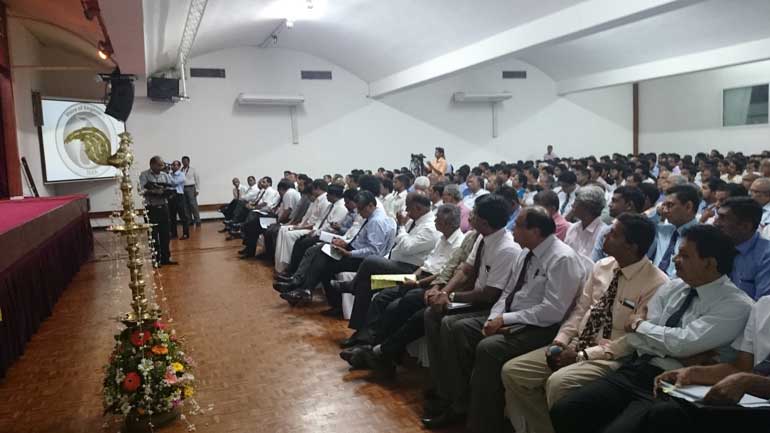Friday Feb 20, 2026
Friday Feb 20, 2026
Saturday, 3 October 2015 00:00 - - {{hitsCtrl.values.hits}}
 The audience of professionals, government representatives and media at the seminar
The audience of professionals, government representatives and media at the seminar
The Sri Lankan Engineers’ Association recently took it upon themselves to initiate a dialogue on the proposed India-Sri Lanka bilateral Cooperation Agreement. Centred on advocating impartial, transparent evaluation and factual studies of the partnership, the Sri Lankan Engineers Association conducted a workshop style event to educate interested parties on the agreement and what it could imply to the Sri Lankan economy.
Speaking on the event and its goals, Sri Lankan Engineers’ Association President Palitha Abeywardena explained, “It is of great importance that all professionals in the country are aware of and hold an opinion on the proposed Economic Partnership Agreement. Not only does it hold a great deal of untapped potential for both countries, it also has wide-reaching implications. Our goals with the event were to create fact based rational awareness among all parties and to encourage affected parties to lobby the Government to ensure that the necessary legislative framework and safeguards are in place to protect Sri Lankans before signing the agreement and opening up to India. Most of the aspects covered in the proposed agreement will have a negative impact on the Sri Lankan economy, culture and political climate, and as such needs to be given the proper forethought and attention.”
The proposed trade liberalisation covered within the Comprehensive Economic Partnership Agreement stands upon four pillars; namely goods, professional services, free movement of people and opening up investment. The Sri Lankan Engineers’ Association has in the past carried out successful seminars, addressing professionals from across all industries and including Government representatives to ensure legislators will hear that professional viewpoint before making any such bilateral commitments
Speaking at the event keynote speaker Gamini Nanda Gunawardana expressed his views on the impact the Economic Partnership Agreement would have on the local economy and job market. “It is of imperative importance that every single level of professional understands what this agreement will imply for the industries across Sri Lanka. The massive influx of cheap labour from India and the benefits given to them under the ‘National Treatment’ clause will allow incumbent workers the same rights, benefits or privileges granted to Sri Lankan citizens – and while India has heavily legislated the privileges extended to Sri Lankan workers on their soil, we have as yet, not done so.
There is also a massive disparity in the qualified personnel that will be flooding the job market. Where Sri Lanka produces 1,500 to 2,000 highly qualified engineers each year, which is adequate for forecasted development projects – India produces over 1,500,000 engineers of which 70% is unemployed and unemployable. The disparity in education standard is illustrated in that Sri Lankan professional qualifications involve a four-year curriculum whereas the discussion documents stipulate only three years of experience is required for Indian engineers. In fact the unemployed population in India between the ages of 16 and 28 is over 20 million – more than the population of Sri Lanka,” said Gunawardana, who also pointed out that since the spouse of the professional is allowed to work in Sri Lanka too; there is an added imminent threat to the next level of the work force, affecting other skilled labour positions.
The seminar also touched on the proposed safety measures it believes should be brought in if the Government is to move forward with the signing of the agreement, including revisiting Sri Lankan emigration and immigration laws and amending where necessary, carrying out consensus studies of professional representatives and the facilitation of practice licenses before signing agreements.
Speaking on the success of the program Gunawardana said, “Our aim with these seminars was to create common consensus among professional groups in order for them to have a voice in bilateral agreements that would impact their lives through the liberalisation of services, to identify gaps in the legal system including the issue of professional practice licenses and the conducting of a detailed skill shortage study before opening up the professional services liberalisation.”